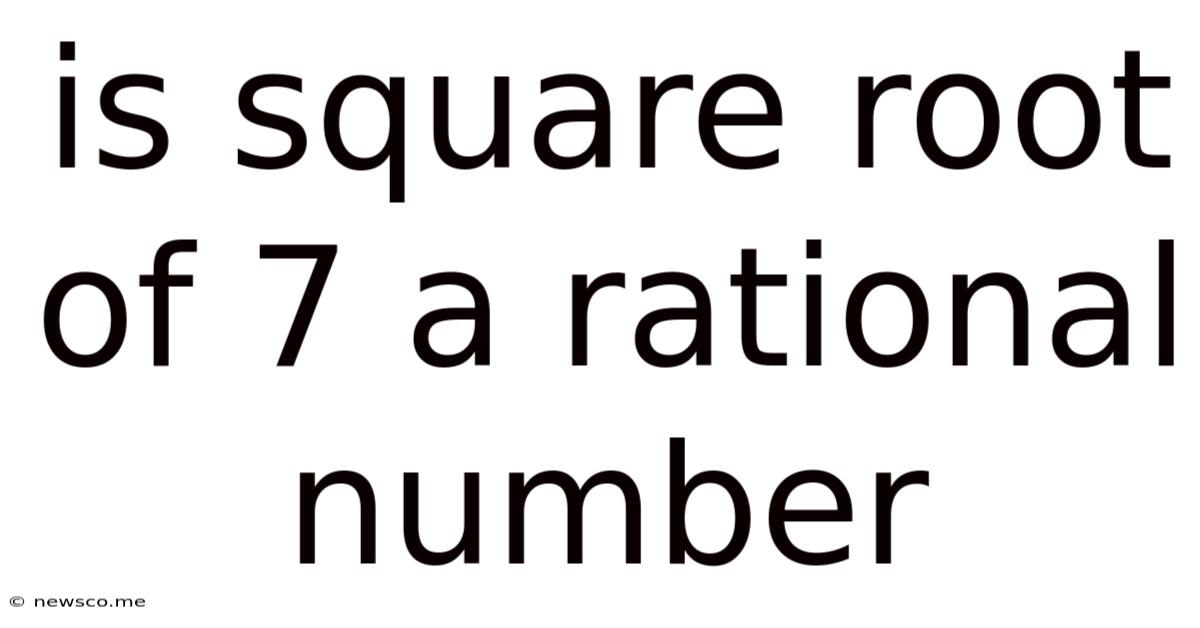Is Square Root Of 7 A Rational Number
News Co
Apr 17, 2025 · 5 min read

Table of Contents
Is the Square Root of 7 a Rational Number? A Deep Dive into Irrationality
The question of whether the square root of 7 is a rational number is a fundamental concept in mathematics, touching upon the core principles of number theory. The answer, in short, is no, the square root of 7 is irrational. However, understanding why requires delving into the definition of rational and irrational numbers, employing proof by contradiction, and exploring the broader implications of this seemingly simple mathematical truth.
Understanding Rational and Irrational Numbers
Before we tackle the square root of 7 specifically, let's establish a clear understanding of the terms "rational" and "irrational."
-
Rational Numbers: A rational number is any number that can be expressed as a fraction p/q, where 'p' and 'q' are integers (whole numbers), and 'q' is not zero. Examples include 1/2, 3/4, -2/5, and even whole numbers like 5 (which can be expressed as 5/1). The key is the ability to represent the number as a ratio of two integers.
-
Irrational Numbers: Irrational numbers cannot be expressed as a fraction of two integers. Their decimal representation is non-terminating (it doesn't end) and non-repeating (there's no pattern of digits that repeats indefinitely). Famous examples include π (pi) and e (Euler's number).
Proving the Irrationality of √7: Proof by Contradiction
The most common and elegant way to demonstrate that √7 is irrational is through a proof by contradiction. This method assumes the opposite of what we want to prove and then shows that this assumption leads to a logical contradiction, thus proving the original statement.
1. The Assumption: Let's assume, for the sake of contradiction, that √7 is a rational number. This means we can express it as a fraction p/q, where p and q are integers, q ≠ 0, and the fraction is in its simplest form (meaning p and q have no common factors other than 1).
2. Squaring Both Sides: If √7 = p/q, then squaring both sides gives us:
7 = p²/q²
3. Rearranging the Equation: Multiplying both sides by q² gives:
7q² = p²
4. Deduction about Divisibility: This equation tells us that p² is divisible by 7. Since 7 is a prime number, this implies that p itself must also be divisible by 7. We can express this as p = 7k, where k is another integer.
5. Substitution and Simplification: Substituting p = 7k back into the equation 7q² = p², we get:
7q² = (7k)² 7q² = 49k² q² = 7k²
6. The Contradiction: This equation shows that q² is also divisible by 7, and therefore q must be divisible by 7.
7. The Final Conclusion: We've now reached a contradiction. We initially assumed that p/q was in its simplest form, meaning p and q had no common factors. However, we've just shown that both p and q are divisible by 7, meaning they do share a common factor. This contradiction arises from our initial assumption that √7 is rational. Therefore, our assumption must be false, and √7 is irrational.
Understanding the Implications of Irrationality
The irrationality of √7, and other irrational numbers, has significant implications across various fields:
-
Geometry: Consider a square with a side length of 1. Its diagonal has a length of √2 (by the Pythagorean theorem). Since √2 is irrational, this means you can't accurately represent the diagonal's length using only rational numbers. This concept extends to other geometric constructions involving irrational lengths.
-
Calculus: Irrational numbers play a crucial role in calculus, especially in the context of limits and infinite series. Many important functions and constants are inherently irrational.
-
Number Theory: The study of irrational numbers is a central theme in number theory, contributing to our understanding of the structure and properties of numbers. Proofs related to irrationality often involve sophisticated techniques and deep mathematical concepts.
Exploring Other Irrational Square Roots
The method used to prove the irrationality of √7 can be generalized to prove the irrationality of the square root of many other integers. Specifically, the square root of any prime number is irrational. The same proof by contradiction can be applied, leveraging the properties of prime numbers and divisibility. For example, you can similarly prove that √2, √3, √5, √11, and countless others are all irrational.
However, it's important to note that not all square roots are irrational. The square root of a perfect square (like 4, 9, 16, etc.) is always a rational number because it results in an integer, which is a rational number.
Approximating Irrational Numbers
While we can't express irrational numbers exactly as fractions, we can approximate them to any desired degree of accuracy using decimal expansions or continued fractions. For √7, a simple approximation is 2.64575, but this is just an approximation; the decimal representation continues infinitely without repeating. These approximations are crucial in practical applications where exact values are not necessary.
Conclusion: The Significance of √7's Irrationality
The seemingly simple question of whether √7 is rational leads to a deeper understanding of fundamental mathematical concepts. The proof by contradiction highlights the power of logical reasoning in mathematics. The existence of irrational numbers expands the realm of numbers beyond the easily manageable rational numbers and has profound implications across various branches of mathematics and its applications in other fields. Understanding this fundamental truth enriches our appreciation for the elegance and complexity of the number system. The irrationality of √7, therefore, is not just a mathematical fact, but a gateway to a broader and more nuanced understanding of the mathematical world.
Latest Posts
Related Post
Thank you for visiting our website which covers about Is Square Root Of 7 A Rational Number . We hope the information provided has been useful to you. Feel free to contact us if you have any questions or need further assistance. See you next time and don't miss to bookmark.